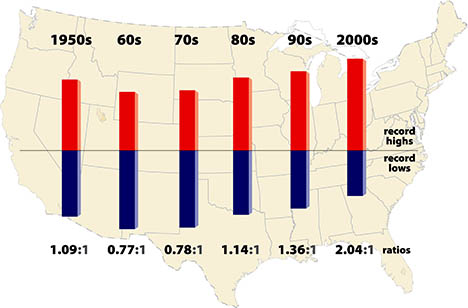 Arguments
Arguments
 Software
Software
 Resources
Comments
Resources
Comments
 The Consensus Project
The Consensus Project
 Translations
Translations
 About
Support
About
Support


Latest Posts
- Skeptical Science New Research for Week #47 2024
- Durability of carbon dioxide removal is critical for stabilizing temperatures
- Sabin 33 #3 - Solar panels generate too much waste and will overwhelm landfills
- Here’s how governments could fix their Paris climate commitment failures
- 2024 SkS Weekly Climate Change & Global Warming News Roundup #46
- Skeptical Science New Research for Week #46 2024
- 20 fact briefs published in collaboration with Gigafact!
- Sabin 33 #2 - Are toxic heavy metals from solar panels posing a threat to human health?
- 2024 will be the first year above 1.5°C
- 2024 SkS Weekly Climate Change & Global Warming News Roundup #45
- Fact brief - Is there an expert consensus on human-caused global warming?
- Skeptical Science New Research for Week #45 2024
- The planet is ‘on the brink of an irreversible climate disaster,’ scientists warn
- Sabin 33 #1 - Are electromagnetic fields from solar farms harmful to human health?
- Volunteer activity: Evaluate automated climate misinformation debunkings
- 2024 SkS Weekly Climate Change & Global Warming News Roundup #44
- Fact brief - Are most glaciers growing?
- Rebutting 33 False Claims About Solar, Wind, and Electric Vehicles thanks to the Sabin Center for Climate Change Law
- Skeptical Science New Research for Week #44 2024
- The hidden health toll of hurricanes
- Climate Adam: Is climate change fuelling mega hurricanes?
- Jobs in wind, solar, and energy storage are booming. Is your state keeping up?
- 2024 SkS Weekly Climate Change & Global Warming News Roundup #43
- Fact brief - Do volcanoes emit more CO2 than humans?
- Skeptical Science New Research for Week #43 2024
- Why widening highways doesn’t reduce traffic congestion
- Climate Risk
- Welcome to the world of personal air conditioning
- 2024 SkS Weekly Climate Change & Global Warming News Roundup #42
- Skeptical Science New Research for Week #42 2024
Archived Rebuttal
This is the archived Basic rebuttal to the climate myth "Scientists can't even predict weather". Click here to view the latest rebuttal.
What the science says...
|
Weather and climate are different; climate predictions do not need weather detail. |
This claim is based more on an appeal to emotion than fact. The inference is that climate predictions, decades into the future, cannot be possibly right when the weather forecast for the next day has some uncertainty.
In spite of the claim in this myth, short term weather forecasts are highly accurate and have improved dramatically over the last three decades. However, slight errors in initial conditions make a forecast beyond two weeks nearly impossible.
Atmospheric science students are taught "weather is what you get and climate is the weather you expect". This is why this common skeptical argument doesn't hold water. Climate models are not predicting day to day weather systems. Instead, they are predicting climate averages.

Figure 1: Record highs are an example of extreme weather, but an increase in record highs versus record lows is a symptom of a changing climate. From Meehl et al. 2009.
A change in temperature of 7º Celsius from one day to the next is barely worth noting when you are discussing weather. Seven degrees, however, make a dramatic difference when talking about climate. When the Earth's AVERAGE temperature was 7ºC cooler than the present, ice sheets a mile thick were on top of Manhattan!
A good analogy of the difference between weather and climate is to consider a swimming pool. Imagine that the pool is being slowly filled. If someone dives in there will be waves. The waves are weather, and the average water level is the climate. A diver jumping into the pool the next day will create more waves, but the water level (aka the climate) will be higher as more water flows into the pool.
In the atmosphere the water hose is increasing greenhouse gases. They will cause the climate to warm but we will still have changing weather (waves). Climate scientists use models to forecast the average water level in the pool, not the waves. A good basic explanation of climate models is available in Climate Change- A Multidisciplinary Approach by William Burroughs.
Source: AMS Policy Statement on Weather Analysis and Forecasting. Bull. Amer Met. Soc., 79, 2161-2163
Basic rebuttal written by dansat
Update July 2015:
Here is a related lecture-video from Denial101x - Making Sense of Climate Science Denial
Updated on 2015-07-15 by pattimer.
THE ESCALATOR

(free to republish)
























































